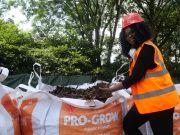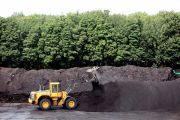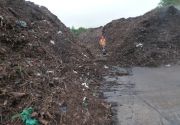Veolia innovation increases composting recovery
Following successful large-scale trials, Veolia has demonstrated a new way of treating the 25% of green waste that ends up being sent for disposal or re-composting. The new process required a £1M investment for a bespoke fixed cleaning line to remove the contamination from the 30,000 tonnes of compost oversize arising each year across four sites in the South.
Approved mulch for gardening and landscaping
This transforms the material into a clean wood product such as PAS100 approved mulch for gardening and landscaping, or a renewable biomass fuel for electricity and heating which replaces virgin alternatives such as woodchip and bark.
By using this more efficient processing, these products can reduce the number of trees cut down for wood products and the process also removes contamination from the composting sites and enhances the quality of composts spread to land.
The effectiveness of the new process means that composting sites will be much more efficient, disposal costs significantly lowered and greenhouse gas impact reduced. To date, more than 55,000 tonnes of contaminated compost oversize has been processed in this way, and the plant is aiming to find alternative use for all contaminants removed and achieve zero waste to landfill.
Veolia currently processes over 500,000 tonnes of green and food waste every year derived from a nationwide network of 11 composting sites that produce over 250,000 tonnes per year, the equivalent to around 12 million bags.
Previously around 25% of green waste ended up as oversize after composting as some green waste bins contain physical contaminants such as plastic and metal, mistakenly discarded by customers. Even after careful processing this contamination ends up in the compost oversize which is the larger, woody fraction remaining after the valuable compost product fraction is removed at the end of the composting process.
If a site runs out of storage space, or if the oversize is too contaminated to re-circulate, there is a cost for landfilling which in turn contributes to greenhouse emissions.
The perfect example of a circular economy
Donald Macphail, Chief Operating Officer - Treatment at Veolia said, "Composting sites provide the perfect example of a circular economy, and the need to efficiently process this material is likely to increase with the prospect of green waste becoming free to collect and on a more regular basis, as pledged in the government's Resources and Waste Strategy.
"By backing this new innovation we have increased the effectiveness of operations and will provide additional high quality sustainable wood mulch and renewable fuels. This will help horticulture and renewable energy generation, and is another key step that we are taking to reduce environmental impact and advance towards a lower carbon economy.”
For more information visit www.veolia.co.uk .



